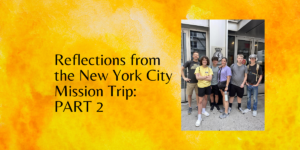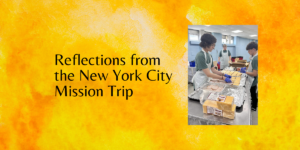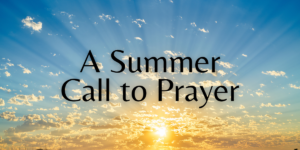The St. John’s Pulpit
St. John’s Baptist Church 300 Hawthorne Lane Charlotte, NC 28204
704.333.5428 www.stjohnsbaptistchurch.org
THE DANGER OF PRAYING
Romans 12:1-2 and Matthew 6:5-13
Twenty-second Sunday After Pentecost, November 10, 2019
by Senior Minister, Rev. Dennis W. Foust, PhD
My father told me a story about my great-grandfather I thought to be unbelievable. So, I asked my grandfather if the story were true; the story was about his father. He confirmed the story to be true and told it to me in detail. You decide if you think it is believable.
Rev. Will Foust, my great grandfather, was a circuit rider preacher in the late 1800s and early 1900s. At one point, he served eight Methodist and Baptist churches simultaneously. Riding his horse through undeveloped territory on his circuit each weekend, he carried both a rifle and pistol with him on these journeys. He always carried his guns and saddle bags into each sanctuary with him. On one occasion, as he was praying in worship, the building began to shake. At first, the people thought it was his powerful prayer. Actually, four boys had run some hogs under the sanctuary which rested atop support stones under the floor joists. After the boys trapped the hogs under the little frame country church building, the boys started making noises and throwing rocks at them. The hogs resented that action and started bucking under the floor causing the entire wooden structure to begin rocking and resulting in shouts by the worshippers not inspired by the Holy Spirit. Rev. Will ended his prayer, walked outside with his rifle, shot into the air and marched the boys inside. Those boys sat on the front pew through the whole service with the pistol of Will Foust in full view on the pulpit. Evidently, the hogs found their way home.
This is the only story I’ve heard about hogs getting loose in a church. I have been present when wasps got loose from the attic through light fixtures. I have heard of stray cats, wandering dogs and squirrels getting loose in a church.
Some people said the church trembled that day as Rev. Will Foust prayed.
CAN YOU IMAGINE WHAT MIGHT HAPPEN IF PRAYER REALLY GOT LOOSE AMONG US?
HAVE YOU EVER CONSIDERED THE DANGER OF PRAYING?
When you pray, “Thy kingdom come, Thy will be done on earth as it is in heaven,” do you realize what you are asking – what you are praying? You are opening yourself to danger. You are acknowledging the discrepancies between God’s will for humanity and our reality. And you are asking God to use you as a change agent on earth. You are asking God to make God’s will your will; for God’s kingdom cannot be done on earth unless it is done in you and through you. When you pray, ““Thy kingdom come, Thy will be done on earth as it is in heaven,” you are asking God to correct everything in your life that does not does not reflect God’s vision and God’s character. This is a dangerous prayer.
Through prayer, we present ourselves as living sacrifices unto God. This is our spiritual worship. We are not conformed to this world; we are transformed by God’s will.
According to Jesus, when we pray, we are doing one of two things:
We may be merely tossing empty phrases into the air; a practice Jesus condemned.
He warned against praying like hypocrites; praying to draw attention to oneself.
Jesus said we should not use prayer just to make people think we are devoted.
Jesus taught that our prayers should express our devotion to a relationship with God.
We pray for God to deepen our devotion to God’s kingdom and God’s will.
Praying is dangerous work because it asks God to remake us.
When you pray, to some extent, you practice what neuroscientists call ‘neuroplasticity.’
Several research studies show how prayer contributes to healing and recovery.
When you pray, you are setting your intentions; recalibrating the compass of your spirit. When you pray, you are asking God to equip you with God’s vision and power.
When you pray, you are asking God to do something you cannot do by yourself.
When you pray, you are asking God to do in you what you cannot make happen in you.
When you pray, you are asking God to create a future you cannot create by human power.
When you pray, you are asking God to help your commitment to be a servant of God’s will.
When you pray, you are asking God to shatter the status quo in you and in the world.
Jesus teaches that some persons merely try to maintain the status quo in their life. When a person seeks to protect their way of life and the kingdoms to which they are committed that do not reflect God’s kingdom vision, then they cannot truly pray the Lord’s prayer.
The Lord’s Prayer is dangerous; it’s not for the hypocrites.
HOWEVER, IF YOU WANT TO FOLLOW THE WAY OF JESUS BY PRAYING AS HE TAUGHT YOU TO PRAY, THEN YOU SHOULD REMEMBER THE FOLLOWING:
When you pray the way Jesus taught you to pray, the floor may shift under your feet.
When you pray the way Jesus taught you to pray, you are working against the powers that
work against God’s ways.
Paul encouraged the early Church in Ephesus to pray. He encouraged them to remember there is opposition to their praying. He told them that their opposition is not merely the individual or the group they can see. He wrote:
“…our struggle is not against enemies of blood and flesh, but against the rulers, against the authorities, against the cosmic powers of this present darkness, against the spiritual forces of evil in the heavenly places.” (Ephesians 6:12)
PRAYER CONNECTS US WITH GOD, WITH ONE ANOTHER AND WITH THE WORLD.
By opening your life to the practice of prayer, you become closer to God, to God’s perspective of others and more aware of yourself as a member of the human family.
Henri Nouwen, in his helpful book, ‘Here and Now; Living in the Spirit,’ writes:
In my home country, the Netherlands, you will see many large wagon wheels, not on wagons, but as decorations at the entrances of farms or on the walls of restaurants. I have always been fascinated by those wagon wheels; with their wide rims, strong wooden spokes, and big hubs. These wheels help me to understand the importance of a life lived from the center, through prayer. When I move along the rim, I can reach one spoke after the other, but when I stay at the hub, I am in touch with all the spokes at once.
To pray is to move to the center of all life and all love. The closer I come to the hub of life, the closer I come to all that receives its strength and energy from there.
My tendency is to get so distracted by the diversity of the many spokes of life, that I am busy but not truly life-giving, all over the place but not focused. By directing my attention to the heart of life, I am connected with its rich variety while remaining centered. What does the hub represent? I think of it as my own heart, the heart of God and the heart of the world. When I pray, I enter into the depth of my own heart and find there the heart of God, who speaks to me of love. And I recognize, right there, the place where all of my sisters and brothers are in communion with one another. The great paradox of the spiritual life is, indeed, that the most personal is most universal, that the most intimate, is most communal, and that the most contemplative is most active.” Our prayers are also actions!
This past week, I’ve asked a few people these questions: “When a person says to you, ‘I am praying for you,’ or ‘You are in my prayers,’ what does that mean to you? How does it make you feel? What does it cause you to think?” I also asked, “When you say to a person, ‘I am praying for you,’ or ‘You are in my prayers,’ what are you meaning to communicate? Do you really pray for other people when you say these words to them? When you do pray for other people, what are you expecting to happen?” I received excellent and diverse responses.
What about you?
Basically, my questions are these?
Do you believe God uses your prayers to bring about change?
When you pray for one another, or a situation, are you expecting God to be active?
Of course, we have many questions about prayer in our skeptical, cynical, scientific age.
Let’s be honest, we want to know what prayer is and what prayer is not.
We want to understand more fully what happens when we pray.
Prayer is the keystone in active faith. Like a keystone in an arch holds the weight, prayer is the element at the top of Christian discipleship.
As a follower of Jesus, I pray because Jesus prayed and because he expects us to pray.
Jesus was called Rabbi (teacher); his chosen twelve were called, ‘disciples’ (learners).
Yet, there is only one record in all four Gospels, (Matthew, Mark, Luke & John), when those disciples asked Rabbi Jesus to teach them something. They said, “Lord, teach us to pray.”
And, it seems exceedingly important that Jesus did not say, “If you pray, pray in this way.” Jesus said, “when you pray.” For Jesus, prayer was a practice of active faith we must never neglect. Prayer is the keystone in our relationship with God.
Today, I remind you that our covenant consists of six commitments. These are not merely commitments to one another or to St. John’s as an institution. These commitments to worship, grow, care, steward, witness and serve are commitments to God; they are like bricks to form an archway. And, then, the keystone is set in place to carry the weight, provide the support and assure the strength.
So, we pray, “Almighty God, Father of us all, witness this Covenant which we make with each other and with Thee. Guide us as we try to do that which pleases Thee, to the glory of Thy Son, Jesus Christ our Lord. Amen.” And AMEN! (May it be so!)









